- Home
- Fergus Hume
The Millionaire Mystery Page 11
The Millionaire Mystery Read online
Page 11
‘Ah!’ cried the foreigner, with an ironical smile. ‘None so blind as those who won’t see. What a pity that Marlow and Warrender are both dead!’
‘Oh, you know that?’
‘As I had the honour of telling Miss Marlow’—Lestrange put so sneering an accent on the name that Alan felt inclined to kick him—‘I know that. I landed in England from Jamaica only two days ago. But, as you know, everyone is talking of the mystery, and by this time I know the case as well as you do.’
Alan winced, and Sophy glanced at him apprehensively. Would her champion fail her? Would this man prove his claim? She was in deadly terror lest he should. But Alan had no intention of yielding.
‘Go on,’ he said again. ‘Miss Marlow and I will hear your story.’
‘Very good. I am glad to see that you have the British instinct of fair play. I will be as brief as possible, and you can ask me any questions you wish. My name is Achille Lestrange, the man who is mentioned in that certificate. I am—or, rather, I was—a Captain in the Peruvian Army. I retired after the war between that country and Chile. However, I have ample means to live on, and I retain my military rank, out of sheer vanity, if you will.’
‘All this,’ said Alan, ‘is beside the point.’
‘It is necessary to explain my position. More than twenty years ago I was married at Kingston to Zelia Durand. We had one child—a little girl—the same who now sits beside you.’
‘I won’t hear of it!’ cried Sophy angrily.
‘We shall see,’ he went on cheerfully. ‘You may change your mind when I have got to the end of my story. I regret to say that Mrs Lestrange—I do not call her Madame,’ explained the Captain, ‘because I am truly English in speech and manner—well, Mrs Lestrange had a bad temper. We did not get on well together. And, besides, I was jealous’—his eyes flashed fire—‘yes, I was jealous of Herbert Beauchamp.’
‘Herbert Beauchamp!’ Alan thought of Marlow’s will and of the legacy. How did this man come to know the name?
CHAPTER XIII
A STRANGE STORY—continued
CAPTAIN LESTRANGE recovered from his momentary emotion, and raised his eyebrows at Alan’s involuntary exclamation.
‘I beg your pardon, Mr Thorold.’
‘Nothing,’ said the other hastily. ‘I fancied the name was familiar.’
‘Ah! You may have heard Marlow mention it.’
‘No. He never spoke of his past life.’
‘He had good reason to be reticent, as you shall hear.’
But here Sophy burst out: ‘Be good enough to continue your story without vilifying my father.’
‘Your father!’ sneered the Captain.
‘The story—the story!’ cried Alan.
‘I continue,’ said Lestrange, with a nod. ‘As I say, I was jealous of Beauchamp, for before our marriage he had been an admirer of my Zelia’s. And, as a matter of fact, she was a singularly attractive woman. You might guess as much,’ added he blandly, ‘seeing that her grace and beauty are reproduced in her daughter. But to continue: Zelia had many admirers, three of whom she distinguished above the others—myself, Herbert Beauchamp, and my cousin, Jean Lestrange. I was the lucky man who won her. Jean ceased to pay any attention to her after the marriage, but Beauchamp was persistent. I remonstrated with him—we nearly had a duel—but to no purpose; and I am sorry to say that Zelia encouraged him.’
‘Proceed with your story, and leave my mother alone,’ cried Sophy.
Alan started, for he remembered with a pang that Sophy had told him her mother’s name was Zelia; but he kept silent, and a terrible dread came over him that this man would prove his statements after all.
Meanwhile the narrator went on pleasantly.
‘Beauchamp,’ he said, fingering his moustache, ‘was a sugar-planter—at least, he was supposed to be one. He had a plantation some miles from the town of Falmouth, which is on the other side of Jamaica. It was there that Dr Warrender practised. He was a bachelor in those days, and he was considered rather a wild fellow. Probably for that reason he was a bosom friend of Beauchamp’s.’
‘Do you mean to infer that Beauchamp was wild?’
‘Well, not exactly. I must be honest. He was adventuresome rather than wild. He was fond of yachting, and had a smart sailing boat in which he used to cruise amongst the islands. Warrender frequently went with him. Beauchamp was a very handsome man, and extremely popular with women. I know that to my cost,’ he added bitterly, ‘when he set his affections on Zelia. She was my wife—she was the mother of my child—yet she eloped with him.’
‘I—I—don’t believe it,’ said Sophy in a suffocating voice.
‘If it were not true, my child, you would not be sitting there under the false name of Sophia Marlow.’
‘One moment,’ put in Alan, clasping the girl’s hand, ‘you have yet to prove that Miss Marlow is Marie Lestrange.’
‘If you would not interrupt so often, I could do so,’ said the man insolently. ‘As I say, Zelia ran away with Beauchamp. He brought his yacht to Kingston when I was absent, and sailed off with her. She carried with her my child—my adorable Marie.’ Here Lestrange fixed an affectionate look on Sophy. ‘I returned to find my home dishonoured,’ he went on, ‘my life wrecked. Jean came to console me. He also had heard of Beauchamp’s treachery, and that the boat had sailed for Falmouth. We followed—’
Here Lestrange broke down. Whether his emotion was genuine or not, Alan could not say. He looked at Sophy, and she at him. Having fought down his emotion, the Captain resumed his seat and his story:
‘Jean and I arrived at Falmouth. There we heard that Zelia was very ill, and that Beauchamp had taken her to his plantation. Dr Warrender, our informant said, was in attendance. The whole town knew that she was my wife, that she had dishonoured me, and that I was on my may to settle accounts with the man who had wrecked my happiness. My cousin and I rode out to Beauchamp’s plantation, for it was within a few miles of Falmouth, as I said. The night was dark and stormy—we arrived in pouring rain, and by the wailing of the negroes we knew that death was in the house. Yes’—he grew dramatic—‘Zelia was dead; torture, remorse, sorrow, had brought about her punishment!’
‘You are very ready to condemn her,’ said Alan.
‘She had dishonoured me!’ cried the man, waxing melodramatic. ‘It was well that she should die. I rushed away to her room, where she lay calm in death, and Jean remained to arrange matters with Beauchamp. I challenged him to a duel. Jean was my second. But Beauchamp refused to fight, and—he murdered Jean.’
‘Murdered your cousin?’ queried Alan sceptically.
‘Yes. I was praying beside my wife’s bed. I heard cries for help, and when I came out I found Jean dead, stabbed to the heart by Beauchamp. The scoundrel had fled—he had taken my child with him.’
‘Why should he have encumbered himself with the child?’
‘To wring my heart!’ replied Lestrange savagely. ‘He knew that I loved my little Marie. He carried her away. I would have followed, but all my troubles and the shock of Zelia’s death brought on an attack of fever. I rose from my bed weeks later to hear that Beauchamp had vanished. On the night he committed the double crimes of murder and kidnapping he went on board his yacht at Falmouth, and was never heard of again. I searched for him everywhere, but without success.’
‘What about his estate?’ asked Alan.
‘There he has been cunning. It seemed that he had long since planned to elope with Zelia, and that some weeks before he had sold his land. He took the money with him, and the child. Had Zelia been alive she would have gone too. As months and years went by, I gave up hope, and I believed that the yacht had foundered.’
Suddenly Sophy got up, much agitated.
‘I can listen to this no longer,’ she said. ‘You are telling lies.’
‘Her mother’s temper,’ muttered Lestrange. ‘Zelia’s masterly way of crushing argument.’
‘Don’t call her my mother!’ cried Sophy. ‘I wo
n’t have it. I am not the child that was taken away by Beauchamp. I never knew anyone of that name.’
‘Probably not,’ replied Lestrange smoothly. ‘There were reasons for its being kept from you. But Mr Thorold—’
‘Mr Thorold is waiting to hear the end of the story,’ said that gentleman coolly. ‘I have yet to hear who Beauchamp is and how you traced him.’
‘This is mere evasion.’ The Captain was losing his temper somewhat. ‘You know who the man is as well as I do.’
‘I am waiting to hear how you connect the two.’
‘What two?’ asked Miss Marlow.
But in her own heart she knew the answer. Yet, like a loyal soul, she kept true to the memory of the dead.
Lestrange took no notice of her.
‘You are either very dull or very cunning,’ he said addressing Alan pointedly. ‘The latter, I think. How did I find Beauchamp again? In a curious way. I saw an illustrated paper in Jamaica, which gave a portrait of the famous South African millionaire, Richard Marlow. The face had on its right cheek a jagged scar. Jean gave that scar to Beauchamp with his diamond ring. No doubt it was the drawing of blood which led to the murder.’
‘Then you assert that Marlow was none other than Herbert Beauchamp?’
‘I do. Also that Sophia Marlow is my child whom he carried away. I have mourned her for twenty years. By the accident of the illustrated paper I have traced her. At Southampton I heard of Marlow’s death, so I knew that he had escaped punishment on earth. But at least I have found my dear child Marie.’
‘I am not your child!’ she cried. ‘I will never acknowledge you as my father.’
‘In that case’—Lestrange rose to his feet and looked very stern—‘I must appeal to the law.’
Alan laughed.
‘The law can’t help you,’ he said. ‘Sophy is over age and her own mistress. Even if you can prove your case, you cannot force her to go with you.’
‘Natural affection—’
‘Don’t talk to me about natural affection!’ cried the girl. ‘I know nothing about you. Nothing in the world will make me go with you!’
‘But if I tell my story to the world?’ cried Lestrange, hinting a threat.
‘Tell it, by all means,’ said Thorold, putting his arm round Sophy. ‘You can hurt only the memory of the dead. Even if Marlow, as you assert, killed your cousin, he is dead, and beyond your reach.’
‘Are you so sure he is dead?’ sneered the man.
‘Of course we are sure,’ cried Sophy indignantly. ‘Didn’t I see him dead in his coffin?’
‘Well,’ said Lestrange, preparing to go, ‘it is most extraordinary to me that he should have died so suddenly and so conveniently. His body, too, has been stolen. That also is convenient.’
‘Do you mean that he is alive?’
‘Yes. He feigned death to escape me.’
‘How could he have known that you were coming?’
‘I don’t know,’ was the answer, ‘but I shall find out. It shall be my business to search for the body of Richard Marlow.’
‘Do,’ said Thorold calmly. ‘And when you find it you will gain the reward of a thousand pounds.’
‘I shall gain more than that, Mr Thorold. My daughter—’
‘Never! Never! Leave this house, sir, and don’t come near me again!’
The man moved towards the door. He had picked up the certificate and put it in his pocket.
‘You turn your own father out into the street,’ he said. ‘Very good. I shall take my own means of punishing you for your want of filial respect. It is to the bad influence of Mr Thorold that I owe this reception. Be assured, Mr Thorold, that I shall not forget it. To revert to the tongue of my progenitors, I shall say Au revoir but not “Adieu”. We shall meet again.’
And clapping on his hat with a jaunty air, Captain Lestrange walked out of the room.
When the door had closed after him, Sophy turned to Alan.
‘Do you think this story is true?’ she asked.
‘I must admit that there appears to be some truth in it,’ was the reply. ‘The certificate is correct as to your age, your birthday, and your birthplace, and the name of your mother also is correct.’
‘Then, am I that man’s daughter?’
‘Not necessarily. He may have assumed the name. He may—oh, I don’t know what to think! But even if he proves his case, you won’t go with him?’
‘Never! never! How can we find out the truth?’
‘Joe might know. I wish he would come back. I wonder if, after all, your father can be alive—Marlow, I mean.’
‘How can that be? We both saw him dead. Dr Warrender gave a certificate of the death. Why do you ask?’
‘Well, it is strange. In his will a sum of two thousand a year is left to be paid to a man called Herbert Beauchamp, through the Occidental Bank.’
‘And he says that my father was Herbert Beauchamp.’
‘I know. Can your father have feigned death to avoid him?’
‘Impossible. He did not know Captain Lestrange was coming.’
‘Well,’ said Alan slowly, ‘there was that West Indian letter which agitated him so much. It might have been a warning. However, it is no use theorizing. I’ll go to the Occidental Bank, and find out Herbert Beauchamp.’
‘You won’t find that he is my own father, Alan; I am sure of that. He may be a relative. No, no! He is not a murderer! He is dead—quite dead! I don’t believe a word of the story.’
Alan sighed.
‘Time alone can prove its truth or falsehood, Sophy,’ he said.
CHAPTER XIV
THE ENMITY OF CAPTAIN LESTRANGE
THAT same evening the Rector was coming in to dine with Alan. The young man was glad that he had asked him, for he was anxious to consult his old friend about the strange tale he had heard, and about the steps which should be taken to prove its truth or falsity. He stayed with Sophy till it was nearly six o’clock. Miss Parsh had not been called into counsel. She was too timid, they thought, and too likely to lose her head. Moreover, Alan felt that she would give the girl overmuch sympathy and make her nervous. So he did all the bracing he could, advised her not to take the old lady into her confidence, and rode home to the Abbey Farm in the cool twilight.
As he passed the Good Samaritan, Mrs Timber came flying out in a flutter of excitement.
‘Sir! sir! Mr Thorold!’ she called. And then, as he checked his horse: ‘Is the gentleman all right? He’s a furriner, and I never did hold as they could pay honest.’
‘What are you talking about, Mrs Timber?’ asked the young man, utterly bewildered.
‘Why, of the gentleman you sent to me, sir.’
‘I sent no gentleman. Stay! Do you mean Captain Lestrange?’
‘Yes, sir, that’s his name—a nasty French name. He said you recommended my house. I’m sure I’m very much obliged, Mr Thorold.’ Here Mrs Timber dropped her best curtsy and smiled a sour smile. ‘But I arsk again, sir, is he good pay?’
Alan was amazed at the Captain’s impudence in making him stand sponsor for his respectability.
‘I don’t know anything about the gentleman, Mrs Timber,’ he said, giving his horse the spur. ‘He is a stranger to me.’
‘Oh, is he?’ muttered the landlady to herself as Alan galloped off. ‘Well, he don’t get nothing out of me till I sees the colour of his money. The idea of giving Mr Thorold’s name when he had no right to! Ah! I doubt he’s a robber of the widder and the orphan. But I’ll show him!’
And Mrs Timber, full of wrath, went into her hotel to have it out with her new lodger.
Alan rode fast and hard in the waning light, between the flowering hedgerows—rode to get away from his thoughts. The advent of Lestrange with his cut-and-dried story, with his accusation of the dead, and his claim to be Sophy’s father, was ominous of evil. Alan had his own uncomfortable feelings, but of these he decided to tell no one, not even Phelps, although Phelps was his very good friend. In taking this resol
ution, Alan made a very serious mistake—a mistake which he found out when it was too late to remedy his injudicious silence.
He had just time to dress for dinner before his guest arrived. Knowing that Mr Phelps was dainty in his eating, Mrs Hester had prepared a meal such as the good Rector loved. Alan’s wine was of the best, and he did not stint it, so Mr Phelps addressed himself to the solemn business of dinner, with the conviction that he would enjoy himself; and Alan kept his news to himself until they were in the smoking-room. Then, when his guest was sipping aromatic black coffee and inhaling the fragrance of an excellent cigar, the young Squire felt compelled to speak, and exploded his bombshell without further notice.
‘Mr Phelps, I have unpleasant news,’ he said, filling his pipe.
The clergyman looked piteously at the excellent cigar, and took another sip of the coffee.
‘Oh, Alan, my boy, must you?’
‘You can judge for yourself,’ replied Alan, unable to suppress a smile. ‘Sophy had a visitor today.’
‘Indeed! Anyone connected with these mysteries which so perplex us?’
‘In one way, yes; in another, no. He is a Captain Lestrange.’
‘Lestrange! Lestrange!’ repeated the Rector. ‘I don’t know the name. Who is he?’
‘Sophy’s father!’ said Alan simply, and lighted up, while Mr Phelps remonstrated:
‘My dear Alan, if this is a jest—’
‘It is no jest, sir, but, I fear, a grim reality. This man comes from Jamaica.’
‘Dear me! Marlow came from Jamaica. Does he know—’
‘He knows all Marlow’s past life.’
‘The dev—ahem! God forgive me for swearing. And who was Marlow?’
‘According to Lestrange, a murderer.’
Phelps dropped his cigar and stared at his old pupil.
‘Alan, are you mad?’
‘No. At the present moment I am particularly sane. This man says that Marlow was a murderer, and he himself claims to be Sophy’s father. Take some green Chartreuse, Mr Phelps, and I’ll tell you all about it.’

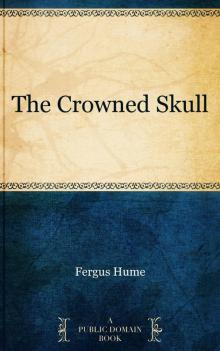 The Crowned Skull
The Crowned Skull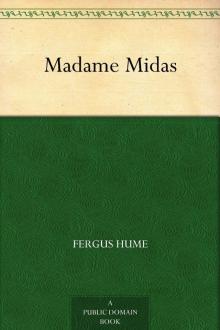 Madame Midas
Madame Midas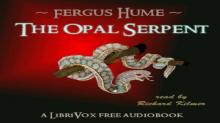 The Opal Serpent
The Opal Serpent The Solitary Farm
The Solitary Farm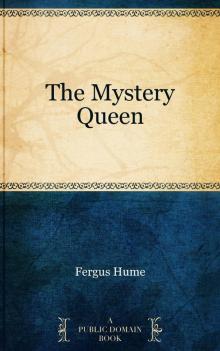 The Mystery Queen
The Mystery Queen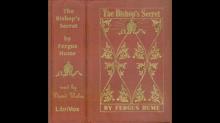 The Bishop's Secret
The Bishop's Secret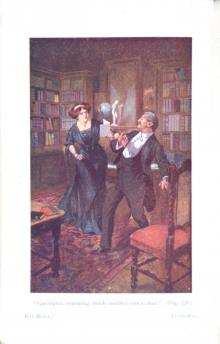 Red Money
Red Money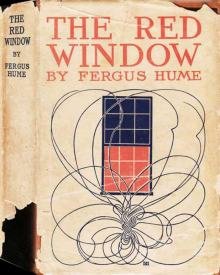 The Red Window
The Red Window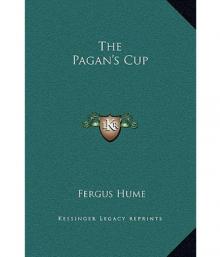 The Pagan's Cup
The Pagan's Cup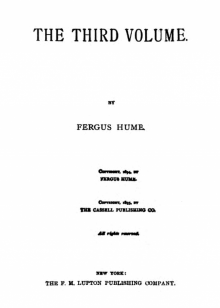 The Third Volume
The Third Volume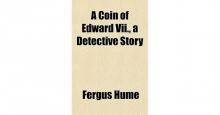 A Coin of Edward VII: A Detective Story
A Coin of Edward VII: A Detective Story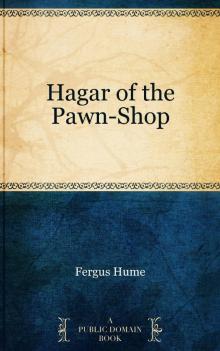 Hagar of the Pawn-Shop
Hagar of the Pawn-Shop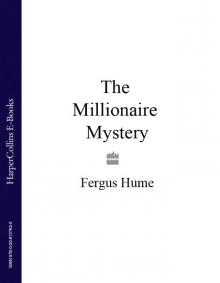 The Millionaire Mystery
The Millionaire Mystery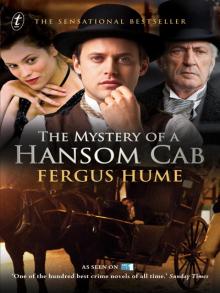 The Mystery of a Hansom Cab
The Mystery of a Hansom Cab